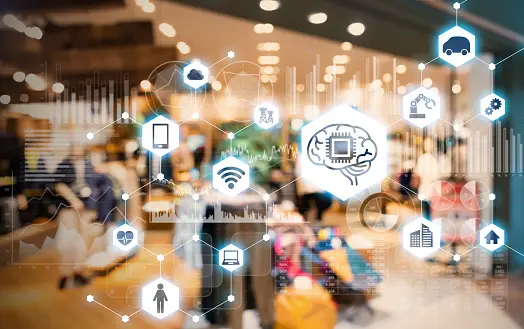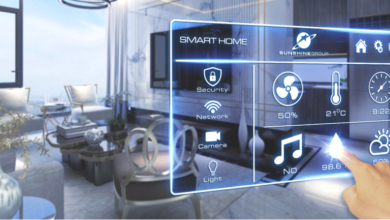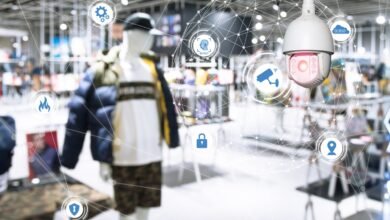
IoT and Retail: How to Enhance Customer Experience In 2024? In the dynamic landscape of the retail industry, the integration of technology has become pivotal in delivering unparalleled customer experiences. One such technological marvel that has reshaped the retail sector is the Internet of Things (IoT). Let’s delve into the transformative journey of IoT and its profound impact on enhancing customer experiences in 2024.
Table of Contents
ToggleThe Evolution of Retail with IoT
IoT has revolutionized how retailers operate, introducing a seamless connection between physical and digital realms. The integration of IoT devices allows retailers to monitor, analyze, and optimize various aspects of their operations. Smart shelves equipped with sensors ensure accurate inventory management, reducing instances of stockouts and overstock.
Personalization in Retail
The heart of customer satisfaction lies in personalization. With IoT, retailers can now offer tailored shopping experiences based on individual preferences and behavior. Imagine receiving product recommendations that align with your unique tastes, all thanks to the data collected through IoT devices. This level of personalization fosters a stronger bond between customers and retailers.
Enhanced In-Store Navigation
Navigating through a vast retail space can be daunting, but IoT has a solution. Beacon technology enables precise in-store navigation, guiding customers to their desired products. Additionally, smart mirrors and interactive displays provide real-time information, creating an engaging and interactive shopping environment.
Optimizing Supply Chain Management
Efficient supply chain management is a key factor in delivering a seamless customer experience. IoT facilitates real-time tracking and monitoring of goods in transit. Retailers can use this data to optimize inventory levels, streamline distribution processes, and ultimately ensure that products are readily available when and where customers need them.
Securing Customer Data
While the benefits of IoT are immense, it’s crucial to address the concerns related to data security. Retailers must implement robust strategies to safeguard customer data collected through IoT devices. Prioritizing privacy builds trust, an essential element in fostering long-term customer relationships.
Improving Checkout Processes
Long checkout queues are a thing of the past, thanks to IoT-powered self-checkout systems. Customers can breeze through the payment process with contactless options, enhancing the overall shopping experience. Retailers benefit from increased efficiency and reduced operational costs.
Challenges and Solutions
Implementing IoT in retail comes with its set of challenges, notably cybersecurity concerns and barriers to implementation. However, proactive measures, such as regular security audits and employee training, can mitigate these challenges, ensuring a secure and smooth integration of IoT technologies.
The Future of IoT in Retail
Looking ahead, the future of IoT in retail holds exciting possibilities. Emerging trends, such as augmented reality shopping experiences and voice-activated assistants, are set to redefine how customers interact with brands. Predictions for 2024 and beyond indicate a continued evolution, with IoT playing a central role in shaping the retail landscape.
Benefits for Retailers
Retailers stand to gain significantly from embracing IoT technologies. Increased efficiency, cost savings, and a competitive edge in the market are just a few of the benefits. By staying ahead of the technological curve, retailers position themselves as innovators in the industry.
Read More: Efficient Energy Management: How to Implement IoT in Your Home In 2024
Case Studies
Examining successful implementation stories provides valuable insights into the positive impact of IoT on customer satisfaction. Real-world examples demonstrate how IoT has streamlined operations, reduced costs, and ultimately elevated the overall retail experience.
Consumer Adoption of IoT in Retail
For IoT to truly revolutionize the retail sector, consumer adoption is key. Awareness and acceptance of IoT technologies among customers play a crucial role. Understanding the factors that influence customer adoption allows retailers to tailor their strategies and effectively introduce IoT into the shopping journey.
Social and Environmental Responsibility
As technology advances, so does the importance of social and environmental responsibility. Sustainable practices in retail IoT, such as energy-efficient devices and eco-friendly packaging, contribute to a positive impact on both the community and the planet.
Conclusion
In conclusion, the synergy between IoT and retail is a game-changer, redefining how customers experience shopping. From personalized recommendations to efficient supply chain management, the benefits are undeniable. As we look forward to 2024 and beyond, the role of IoT in retail is poised to grow, promising an exciting future for both retailers and customers.
FAQs : IoT and Retail
Is IoT only beneficial for large retailers, or can small businesses also leverage its advantages?
IoT offers benefits to businesses of all sizes. While larger retailers may have more extensive resources for implementation, small businesses can leverage IoT to enhance customer experiences, optimize operations, and stay competitive.
How can retailers ensure the security of customer data collected through IoT devices?
Retailers should prioritize cybersecurity measures, including regular security audits, encryption protocols, and employee training on data protection. Implementing robust security strategies ensures the safe collection and storage of customer data.
What are the emerging trends in IoT that are likely to shape the retail landscape in 2024?
In 2024, emerging trends in IoT for retail include augmented reality shopping experiences, voice-activated assistants, and further advancements in personalized recommendations. These trends are expected to redefine how customers interact with brands.
Are there any ethical considerations in using IoT for personalizing customer experiences?
Yes, ethical considerations in IoT include transparency about data collection, obtaining customer consent, and ensuring that personalization efforts respect privacy. Retailers must strike a balance between enhancing customer experiences and respecting ethical principles.
How can retailers encourage customer adoption of IoT in their shopping journey?
Educating customers about the benefits of IoT, ensuring ease of use, and addressing concerns related to data security are key in encouraging customer adoption. Retailers should communicate the value of IoT in enhancing the overall shopping experience.











